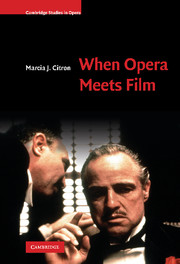Epilogue
Published online by Cambridge University Press: 04 August 2010
Summary
We come full circle to an idea implied at the beginning. Chapter 1 opened with operatic qualities in film, and we saw what that meant in the Godfather trilogy. Operaticness, a related idea, has been mentioned elsewhere, most recently in Chapter 6. Here I would like to close with a few remarks on this important concept. I hope this will help to fill in the picture of opera's involvement with film, and leave the reader with something to think about when opera and film are encountered again.
Operaticness implies that opera is foregrounded, that it is present in an obvious way that makes it recognizable. But what does that mean? It can suggest that essential qualities of opera are emphasized, especially artifice, exaggeration, and emotion. It can imply that opera is celebrated. By that I don't mean that opera is necessarily praised (although it can be), but that it is recognized as something significant or influential. Even opera-films can be assessed for operaticness. Among famous works, for example, Bergman's Magic Flute and Syberberg's Parsifal exhibit operaticness, while Rosi's Bizet's Carmen and Losey's Don Giovanni do not. Rosi's film does its best to minimize opera's essential qualities and cultural significance in a glorification of the common people. Losey also minimizes opera for the purposes of social criticism, but in the process opera itself is a target.
Operaticness ranges widely in our films. In Godfather Part i and Godfather Part ii, operaticness arguably acts as the main aesthetic feature of the films.
- Type
- Chapter
- Information
- When Opera Meets Film , pp. 246 - 249Publisher: Cambridge University PressPrint publication year: 2010



